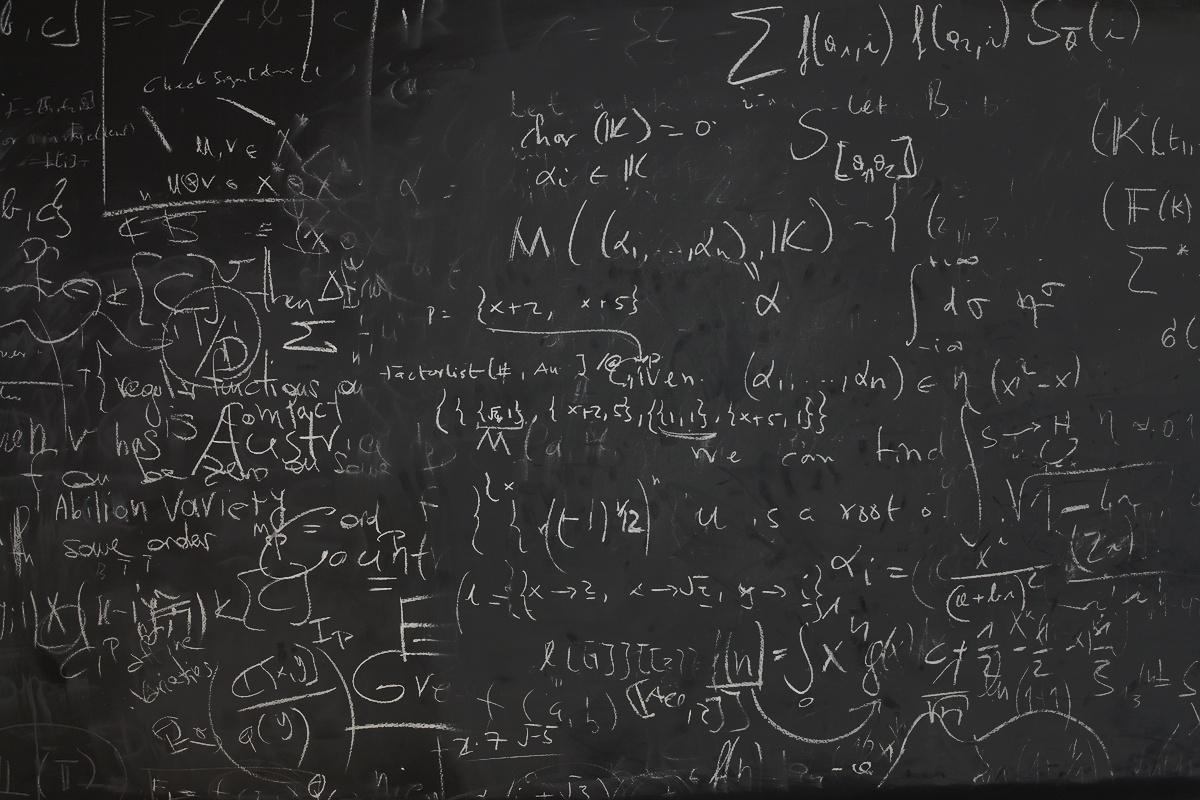Ongoing Projects
Symbolic Techniques for Quantitative Extensions of Equality [SQUEE]
Software
PρLog (pronounced Pē-rō-log) is an experimental tool that extends logic programming with strategic conditional transformation rules, combining Prolog with ρLog calculus. It deals with term sequences (also called hedges), transforming them by conditional rules. Transformations are nondeterministic and may yield ...
This library contains unification, matching, and anti-unification algorithms in various theories developed at RISC. Unification with sequence variables. Context sequence matching. Rigid anti-unification for unranked terms and hedges and its experimental extension with commutative symbols. Unranked second-order anti-unification and its ...
Publications
2024
Solving Quantitative Equations
G. Ehling, T. Kutsia
Technical report no. 24-03 in RISC Report Series, Research Institute for Symbolic Computation (RISC), Johannes Kepler University Linz, Austria. ISSN 2791-4267 (online). April 2024. Licensed under CC BY 4.0 International. [doi] [pdf]author = {G. Ehling and T. Kutsia},
title = {{Solving Quantitative Equations}},
language = {english},
abstract = {Quantitative equational reasoning provides a framework that extends equality to an abstract notion of proximity by endowing equations with an element of a quantale. In this paper, we discuss the unification problem for a special class of shallow subterm-collapse-free quantitative equational theories. We outline rule-based algorithms for solving such equational unification problems over generic as well as idempotent Lawvereian quantales and study their properties.},
number = {24-03},
year = {2024},
month = {April},
keywords = {quantitative equational reasoning, Lawvereian quantales, equational unification},
length = {23},
license = {CC BY 4.0 International},
type = {RISC Report Series},
institution = {Research Institute for Symbolic Computation (RISC), Johannes Kepler University Linz},
address = {Altenberger Straße 69, 4040 Linz, Austria},
issn = {2791-4267 (online)}
}
2023
Automated Programming, Symbolic computation, Machine Learning: My Personal View
Bruno Buchberger
Ann. Math. Artif. Intell. 91(5), pp. 569-589. 2023. 1012-2443.author = {Bruno Buchberger},
title = {{Automated Programming, Symbolic computation, Machine Learning: My Personal View}},
language = {english},
journal = {Ann. Math. Artif. Intell.},
volume = {91},
number = {5},
pages = {569--589},
isbn_issn = {1012-2443},
year = {2023},
refereed = {yes},
length = {21}
}
International Young Talents Hotspot Austria
Bruno Buchberger
In: Ideen, die gehen!, W. Schüssel, G. Kneifel (ed.), pp. 37-39. 2023. Edition Kleine Zeitung, 20234.author = {Bruno Buchberger},
title = {{International Young Talents Hotspot Austria}},
booktitle = {{Ideen, die gehen!}},
language = {english},
pages = {37--39},
publisher = {Edition Kleine Zeitung},
isbn_issn = {20234},
year = {2023},
editor = {W. Schüssel and G. Kneifel},
refereed = {no},
length = {3}
}
Wissenschaft und Meditation: Auf dem Weg zur bewussten Naturgesellschaft
Bruno Buchberger
1st edition, December 2023. Amazon, 979-8868299117.author = {Bruno Buchberger},
title = {{Wissenschaft und Meditation: Auf dem Weg zur bewussten Naturgesellschaft}},
language = {german},
publisher = {Amazon},
isbn_issn = {979-8868299117},
year = {2023},
month = {December},
edition = {1st},
translation = {0},
length = {184}
}
Anti-unification and Generalization: a Survey
David Cerna, Temur Kutsia
In: Proceedings of IJCAI 2023 - 32nd International Joint Conference on Artifical Intelligence, Edith Elkind (ed.), pp. 6563-6573. 2023. ijcai.org, ISBN 978-1-956792-03-4 . [doi]author = {David Cerna and Temur Kutsia},
title = {{Anti-unification and Generalization: a Survey}},
booktitle = {{Proceedings of IJCAI 2023 - 32nd International Joint Conference on Artifical Intelligence}},
language = {english},
pages = {6563--6573},
publisher = {ijcai.org},
isbn_issn = {ISBN 978-1-956792-03-4 },
year = {2023},
editor = {Edith Elkind},
refereed = {yes},
length = {11},
url = {https://doi.org/10.24963/ijcai.2023/736}
}
Equational Anti-Unification over Absorption Theories
Mauricio Ayala-Rincón, David M. Cerna, Andres Felipe Gonzalez Barragan, Temur Kutsia
arXiv:2310.11136. Technical report, 2023. [doi]author = {Mauricio Ayala-Rincón and David M. Cerna and Andres Felipe Gonzalez Barragan and Temur Kutsia},
title = {{Equational Anti-Unification over Absorption Theories}},
language = {english},
year = {2023},
institution = {arXiv:2310.11136},
length = {23},
url = {https://doi.org/10.48550/arXiv.2310.11136}
}
Matching in Quantitative Equational Theories
Georg Ehling, Temur Kutsia
In: UNIF 2023 - 37th International Workshop on Unification, Veena Ravishankar and Christophe Ringeissen (ed.), pp. -. 2023. [url]author = {Georg Ehling and Temur Kutsia},
title = {{Matching in Quantitative Equational Theories}},
booktitle = {{UNIF 2023 - 37th International Workshop on Unification}},
language = {english},
pages = {--},
isbn_issn = { },
year = {2023},
editor = {Veena Ravishankar and Christophe Ringeissen},
refereed = {yes},
sponsor = {FWF},
length = {7},
url = {https://inria.hal.science/hal-04128216}
}
Nominal AC-Matching
Mauricio Ayala-Rincón, Maribel Fernández, Gabriel Ferreira Silva, Temur Kutsia, and Daniele Nantes-Sobrinho
In: Proceedings of the 16th International Conference on Intelligent Computer Mathematics, CICM 2023, Catherine Dubois and Manfred Kerber (ed.), Lecture Notes in Aritificial Intelligence 14101, pp. 53-68. 2023. Springer, ISBN 978-3-031-42752-7. [doi]author = {Mauricio Ayala-Rincón and Maribel Fernández and Gabriel Ferreira Silva and Temur Kutsia and and Daniele Nantes-Sobrinho},
title = {{Nominal AC-Matching}},
booktitle = {{Proceedings of the 16th International Conference on Intelligent Computer Mathematics, CICM 2023}},
language = {english},
series = {Lecture Notes in Aritificial Intelligence},
volume = {14101},
pages = {53--68},
publisher = {Springer},
isbn_issn = {ISBN 978-3-031-42752-7},
year = {2023},
editor = {Catherine Dubois and Manfred Kerber},
refereed = {yes},
length = {16},
url = {https://doi.org/10.1007/978-3-031-42753-4_4}
}
Enumerating All Maximal Clique-Partitions of an Undirected Graph
Mircea Marin, Temur Kutsia, Cleo Pau, Mikheil Rukhaia
In: Proceedings 7th Symposium on Working Formal Methods, FROM 2023, Horatiu Cheval, Laurentiu Leustean, and Andrei Sipos (ed.), pp. 65-79. 2023. [doi]author = {Mircea Marin and Temur Kutsia and Cleo Pau and Mikheil Rukhaia},
title = {{Enumerating All Maximal Clique-Partitions of an Undirected Graph}},
booktitle = {{Proceedings 7th Symposium on Working Formal Methods, FROM 2023}},
language = {english},
pages = {65--79},
isbn_issn = { },
year = {2023},
editor = {Horatiu Cheval and Laurentiu Leustean and and Andrei Sipos},
refereed = {yes},
length = {15},
url = {https://doi.org/10.4204/EPTCS.389.6}
}
2022
Unranked Nominal Unification
Besik Dundua, Temur Kutsia, Mikheil Rukhaia
In: Proceedings of TbiLLC 2019 - 13th International Tbilisi Symposium on Logic, Language, and Computation, Aybüke Özgün and Yulia Zinova (ed.), Proceedings of 13th International Tbilisi Symposium on Logic, Language, and Computation, Lecture Notes in Computer Science 13206, pp. 279-296. 2022. Springer, ISBN 978-3-030-98478-6. [doi] [pdf]author = {Besik Dundua and Temur Kutsia and Mikheil Rukhaia},
title = {{Unranked Nominal Unification}},
booktitle = {{Proceedings of TbiLLC 2019 - 13th International Tbilisi Symposium on Logic, Language, and Computation}},
language = {english},
series = {Lecture Notes in Computer Science},
volume = {13206},
pages = {279--296},
publisher = {Springer},
isbn_issn = {ISBN 978-3-030-98478-6},
year = {2022},
editor = {Aybüke Özgün and Yulia Zinova},
refereed = {yes},
length = {17},
conferencename = {13th International Tbilisi Symposium on Logic, Language, and Computation},
url = {https://doi.org/10.1007/978-3-030-98479-3_14}
}
Nominal Unification and Matching of Higher Order Expressions with Recursive Let
Manfred Schmidt-Schauß, Temur Kutsia, Jordi Levy, Mateu Villaret, Yunus Kutz
Fundamenta Informaticae 185(3), pp. 247-283. 2022. IOS Press, ISSN 1875-8681. [url]author = {Manfred Schmidt-Schauß and Temur Kutsia and Jordi Levy and Mateu Villaret and Yunus Kutz},
title = {{Nominal Unification and Matching of Higher Order Expressions with Recursive Let}},
language = {english},
journal = {Fundamenta Informaticae},
volume = {185},
number = {3},
pages = {247--283},
publisher = {IOS Press},
isbn_issn = {ISSN 1875-8681},
year = {2022},
refereed = {yes},
length = {37},
url = {https://arxiv.org/abs/2102.08146v4}
}
Work-in-progress papers presented at the 15th Conference on Intelligent Computer Mathematics, CICM 2022 (Informal Proceedings)
Kevin Buzzard and Temur Kutsia
, 2022. [url] [pdf]author = {Kevin Buzzard and Temur Kutsia},
title = {{Work-in-progress papers presented at the 15th Conference on Intelligent Computer Mathematics, CICM 2022 (Informal Proceedings)}},
language = {english},
year = {2022},
institution = { },
length = {77},
url = {https://cicm-conference.org/2022/cicm.php}
}
Matching and Generalization Modulo Proximity and Tolerance Relations
Temur Kutsia, Cleo Pau
In: Proceedings of TbiLLC 2019 - 13th International Tbilisi Symposium on Logic, Language, and Computation, Aybüke Özgün and Yulia Zinova (ed.), Lecture Notes in Computer Science 13206, pp. 323-342. 2022. Springer, ISBN 978-3-030-98478-6. [doi] [pdf]author = {Temur Kutsia and Cleo Pau},
title = {{Matching and Generalization Modulo Proximity and Tolerance Relations}},
booktitle = {{Proceedings of TbiLLC 2019 - 13th International Tbilisi Symposium on Logic, Language, and Computation}},
language = {english},
series = {Lecture Notes in Computer Science},
volume = {13206},
pages = {323--342},
publisher = {Springer},
isbn_issn = {ISBN 978-3-030-98478-6},
year = {2022},
editor = {Aybüke Özgün and Yulia Zinova},
refereed = {yes},
length = {20},
url = {https://doi.org/10.1007/978-3-030-98479-3_16}
}
A framework for approximate generalization in quantitative theories
Temur Kutsia, Cleo Pau
Technical report no. 22-04 in RISC Report Series, Research Institute for Symbolic Computation (RISC), Johannes Kepler University Linz, Austria. ISSN 2791-4267 (online). May 2022. Licensed under CC BY 4.0 International. [doi] [pdf]author = {Temur Kutsia and Cleo Pau},
title = {{A framework for approximate generalization in quantitative theories}},
language = {english},
abstract = {Anti-unification aims at computing generalizations for given terms, retaining their common structure and abstracting differences by variables. We study quantitative anti-unification where the notion of the common structure is relaxed into "proximal'' up to the given degree with respect to the given fuzzy proximity relation. Proximal symbols may have different names and arities. We develop a generic set of rules for computing minimal complete sets of approximate generalizations and study their properties. Depending on the characterizations of proximities between symbols and the desired forms of solutions, these rules give rise to different versions of concrete algorithms.},
number = {22-04},
year = {2022},
month = {May},
keywords = {Generalization, anti-unification, quantiative theories, fuzzy proximity relations},
length = {22},
license = {CC BY 4.0 International},
type = {RISC Report Series},
institution = {Research Institute for Symbolic Computation (RISC), Johannes Kepler University Linz},
address = {Altenberger Straße 69, 4040 Linz, Austria},
issn = {2791-4267 (online)}
}
Symbolic Techniques for Approximate Reasoning
Cleo Pau
RISC, JKU. PhD Thesis. 2022. [pdf]author = {Cleo Pau},
title = {{Symbolic Techniques for Approximate Reasoning}},
language = {english},
year = {2022},
translation = {0},
school = {RISC, JKU},
length = {202}
}
A Framework for Approximate Generalization in Quantitative Theories
Temur Kutsia and Cleo Pau
In: Automated Reasoning, Jasmin Blanchette, Laura Kovács, and Dirk Pattinson (ed.), Proceedings of 11th International Joint Conference, IJCAR 2022, Haifa, Israel, August 8-10, 2022, Lecture Notes in Artificial Intelligence 13385, pp. 578-596. 2022. Springer, ISBN 978-3-031-10768-9. [doi]author = {Temur Kutsia and Cleo Pau},
title = {{A Framework for Approximate Generalization in Quantitative Theories}},
booktitle = {{Automated Reasoning}},
language = {english},
series = {Lecture Notes in Artificial Intelligence},
volume = {13385},
pages = {578--596},
publisher = {Springer},
isbn_issn = {ISBN 978-3-031-10768-9},
year = {2022},
editor = {Jasmin Blanchette and Laura Kovács and and Dirk Pattinson},
refereed = {yes},
sponsor = {FWF},
length = {19},
conferencename = {11th International Joint Conference, IJCAR 2022, Haifa, Israel, August 8-10, 2022},
url = {https://doi.org/10.1007/978-3-031-10769-6}
}
2021
A Special Case of Schematic Syntactic Unification
David M. Cerna
CAS ICS / RISC. Technical report, 2021. [pdf]author = {David M. Cerna},
title = {{A Special Case of Schematic Syntactic Unification}},
language = {english},
abstract = {We present a unification problem based on first-order syntactic unification which ask whether every problemin a schematically-defined sequence of unification problems isunifiable, so called loop unification. Alternatively, our problemmay be formulated as a recursive procedure calling first-ordersyntactic unification on certain bindings occurring in the solvedform resulting from unification. Loop unification is closely relatedto Narrowing as the schematic constructions can be seen as arewrite rule applied during unification, and primal grammars, aswe deal with recursive term constructions. However, loop unifi-cation relaxes the restrictions put on variables as fresh as wellas used extra variables may be introduced by rewriting. In thiswork we consider an important special case, so called semiloopunification. We provide a sufficient condition for unifiability of theentire sequence based on the structure of a sufficiently long initialsegment. It remains an open question whether this conditionis also necessary for semiloop unification and how it may beextended to loop unification.},
year = {2021},
institution = {CAS ICS / RISC},
length = {8}
}
AlCons: Deductive Synthesis of Sorting Algorithms in Theorema
I. Dramnesc, T. Jebelean
In: Theoretical Aspects of Computing - ICTAC 2021, A. Cerone, P. Csaba Ölveczky (ed.), Proceedings of 18th International Colloquium on Theoretical Aspects of Computing - ICTAC, Nur-Sultan, Kazakhstan, LNCS 12819, pp. 314-333. September 2021. Springer, 978-3-030-85315-0. [pdf]author = {I. Dramnesc and T. Jebelean},
title = {{AlCons: Deductive Synthesis of Sorting Algorithms in Theorema}},
booktitle = {{Theoretical Aspects of Computing - ICTAC 2021}},
language = {english},
abstract = {We describe the principles and the implementation of AlCons (em Algorithm Constructor), a system for the automatic proof--based synthesis of sorting algorithms on lists and on binary trees, in the frame of the Theorema system. The core of the system is a dedicated prover based on specific inference rules and strategies for constructive proofs over the domains of lists and of binary trees, aimed at the automatic synthesis of sorting algorithms and their auxiliary functions from logical specifications. The specific distinctive feature of our approach is the use of multisets for expressing the fact that two lists (trees) have the same elements. This allows a more natural expression of the properties related to sorting, compared to the classical approach using the permutation relation (a list is a permutation of another). Moreover, the use of multisets leads to special inference rules and strategies which make the proofs more efficient, as for instance: expand/compress multiset terms and solve meta-variables using multiset equalities. Additionally we use a Noetherian induction strategy based on the relation induced by the strict inclusion of multisets, which facilitates the synthesis of arbitrary recursion structures, without having to indicate the recursion schemes in advance. The necessary auxiliary algorithms (like, e.g., for insertion and merging) are generated by the same principles from the synthesis conjectures that are automatically produced during the main proof, using a ``cascading" method, which in fact contributes to the automation of theory exploration. The prover is implemented in the frame of the Theorema system and works in natural style, while the generated algorithms can be immediately tested in the same system.},
series = {LNCS},
volume = {12819},
pages = {314--333},
publisher = {Springer},
isbn_issn = {978-3-030-85315-0},
year = {2021},
month = {September },
editor = {A. Cerone and P. Csaba Ölveczky},
refereed = {yes},
length = {20},
conferencename = {18th International Colloquium on Theoretical Aspects of Computing - ICTAC, Nur-Sultan, Kazakhstan}
}
Variadic equational matching in associative and commutative theories
Besik Dundua, Temur Kutsia, Mircea Marin
Journal of Symbolic Computation 106, pp. 78-109. 2021. Elsevier, ISSN 0747-7171. [doi] [pdf]author = {Besik Dundua and Temur Kutsia and Mircea Marin},
title = {{Variadic equational matching in associative and commutative theories}},
language = {english},
journal = {Journal of Symbolic Computation},
volume = {106},
pages = {78--109},
publisher = {Elsevier},
isbn_issn = {ISSN 0747-7171},
year = {2021},
refereed = {yes},
length = {32},
url = {https://doi.org/10.1016/j.jsc.2021.01.001}
}
9th International Symposium on Symbolic Computation in Software Science (SCSS 2021), short and work-in-progress papers
Temur Kutsia (editor)
Technical report no. 21-16 in RISC Report Series, Research Institute for Symbolic Computation (RISC), Johannes Kepler University Linz, Austria. ISSN 2791-4267 (online). August 2021. Licensed under CC BY 4.0 International. [doi] [pdf]author = {Temur Kutsia (editor)},
title = {{9th International Symposium on Symbolic Computation in Software Science (SCSS 2021), short and work-in-progress papers}},
language = {english},
abstract = {This collection contains short and work-in-progress papers presented at the 9th International Symposium on Symbolic Computation in Software Science, SCSS 2021.},
number = {21-16},
year = {2021},
month = {August},
keywords = {Symbolic computation, software science, artificial intelligence},
length = {56},
license = {CC BY 4.0 International},
type = {RISC Report Series},
institution = {Research Institute for Symbolic Computation (RISC), Johannes Kepler University Linz},
address = {Altenberger Straße 69, 4040 Linz, Austria},
issn = {2791-4267 (online)}
}






